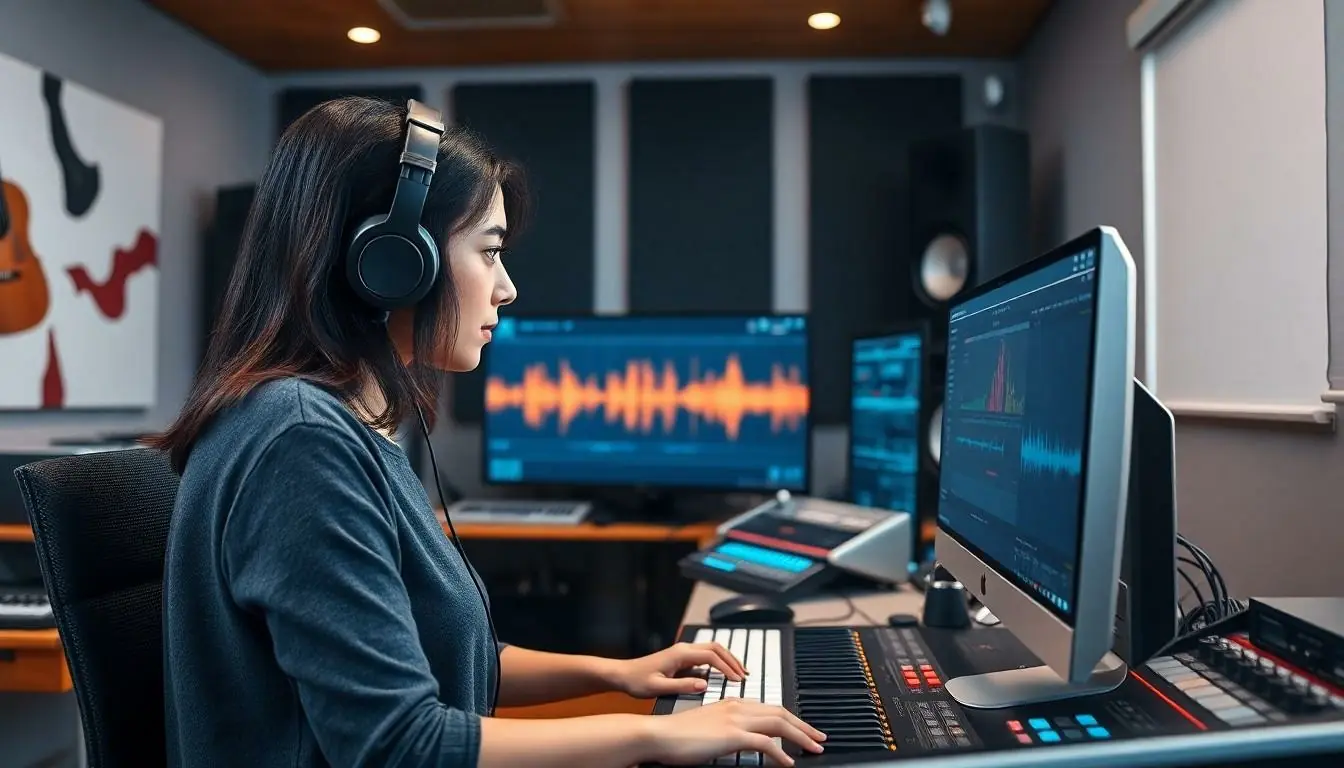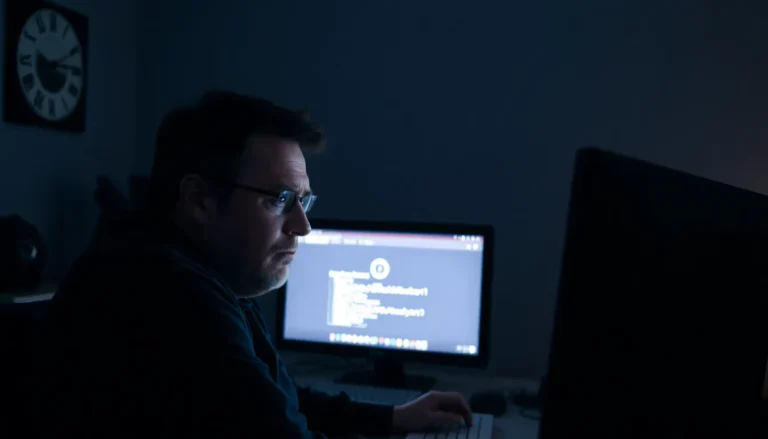Table of Contents
ToggleIn a world where everyone’s a content creator, careers in arts audio/video technology and communications are hotter than a jalapeño in July. With the rise of streaming platforms, podcasts, and viral videos, the demand for skilled professionals in this field is skyrocketing. Whether it’s producing the next blockbuster film or crafting the perfect podcast episode, the opportunities are as vast as the internet itself.
Imagine waking up each day knowing your job involves turning creative ideas into reality. From sound engineers to video editors, these roles blend artistry with technology in a way that keeps the work exciting. So, if you’ve got a passion for storytelling and a knack for tech, it’s time to dive into a career that’s not just a job but a thrilling adventure in the world of arts and media.
Overview of Careers in Arts Audio/Video Technology and Communications
Careers in arts audio/video technology and communications flourish in today’s digital landscape. The industry encompasses diverse roles such as sound engineers, video editors, and content creators. Professionals blend creativity with technical expertise to produce high-quality media.
Sound engineering stands out as a vital role, focusing on recording, mixing, and producing audio content. Video editing specialists shape visual narratives, editing raw footage into compelling stories that engage audiences. Content creators craft online materials for various platforms, including social media and streaming services.
Job opportunities grow due to the demand for skilled professionals who understand both technology and artistic principles. The rise of podcasts and video streaming amplifies this need, creating avenues for innovation. Educational programs provide training in essential areas, equipping aspiring artists with industry-relevant skills.
Networking plays an important role in advancing careers within this sector. Collaborations often lead to new projects, allowing professionals to expand their portfolios. Conferences, trade shows, and online platforms facilitate connections among creators, engineers, and producers.
Freelancing emerges as a popular career choice, offering flexibility and diverse project experiences. Many individuals showcase their skills through personal projects or social media platforms, further attracting clients. Industry trends continuously reshape career paths, ensuring that those who adapt remain competitive.
Technology advancements continually influence the landscape of arts audio/video technology and communications. The shift towards virtual reality and augmented reality introduces additional career paths. As these mediums gain popularity, opportunities for skill development and creative expression expand.
Educational Pathways

Educational pathways in arts, audio/video technology, and communications offer a variety of options to gain the necessary skills. Individuals often pursue degrees or certifications that align with their career goals.
Degree Programs
Degrees play a fundamental role in establishing a career in this field. Commonly offered degrees include Bachelor of Arts in Audio Engineering, Bachelor of Science in Film Production, and Bachelor of Fine Arts in Multimedia Design. Universities and colleges provide these programs, helping students gain both theoretical and hands-on experience. Coursework typically covers sound design, video production, and media communications. Graduates often emerge equipped to use industry-standard equipment and software.
Certification Options
Certification options serve as additional qualifications for professionals. Numerous organizations offer certifications in audio and video technologies, such as Certified Technology Specialist and Pro Tools Certification. Programs focus on specific tools and techniques, enhancing skills in areas like video editing, sound mixing, and broadcasting. Obtaining certification demonstrates a commitment to the field and can boost job prospects significantly. Certifications often cater to varying levels of expertise, making them accessible to beginners and seasoned professionals alike.
Job Opportunities
The arts, audio/video technology, and communications fields offer diverse job opportunities. Skilled professionals in these areas find their talents in high demand.
Entry-Level Positions
Entry-level positions include roles such as sound technician, production assistant, and junior video editor. These roles often require foundational skills in technology and creativity. Experience in internships or personal projects helps candidates stand out. Many employers value practical knowledge alongside academic credentials. Networking at industry events enhances job prospects for newcomers. Career growth often begins with hands-on learning in collaborative environments.
Advanced Career Options
Advanced career options encompass roles like audio engineer, senior video editor, and media production manager. Professionals at this level typically manage complex projects or lead teams. Specialized skills in software, coupled with years of experience, are crucial for success in these positions. Leadership roles often require strong communication skills and the ability to innovate. Continuous education through workshops and certifications keeps professionals competitive. Emerging technologies such as virtual reality and interactive media also present new avenues for advancement.
Skills Required
A successful career in arts, audio/video technology, and communications demands a blend of technical and soft skills. Mastery in both areas enhances employability and adaptability in this ever-changing industry.
Technical Skills
Proficiency in industry-standard software remains critical. Familiarity with editing tools like Adobe Premiere Pro, Final Cut Pro, and Avid Media Composer is often required. Understanding audio engineering equipment proves essential for sound technicians and audio engineers. Knowledge of coding languages, particularly for multimedia applications, can set candidates apart. Utilizing advanced techniques in video production and editing gives professionals a competitive edge. Experience with digital and analog audio equipment also plays a significant role. Familiarity with streaming platforms and social media tools highlights one’s versatility. Keeping up with technological advancements ensures relevance in the field.
Soft Skills
Creativity fuels the development of compelling narratives and engaging content. Effective communication allows professionals to collaborate and present ideas clearly to teams and clients. Strong problem-solving abilities help address challenges quickly, especially under tight deadlines. Time management becomes essential to meet project timelines and prioritize tasks. Adaptability serves professionals well as technologies and trends evolve. Networking skills foster valuable industry connections, leading to potential collaboration opportunities. Collaboration often enriches artistic projects, driving innovative solutions. Passion for storytelling connects individuals with audiences, making their contributions impactful.
Industry Trends
The arts, audio/video technology, and communications sector experiences rapid growth fueled by technological advancements and evolving media consumption habits. Innovation drives many opportunities and defines trends in this dynamic field.
Emerging Technologies
Virtual reality, augmented reality, and artificial intelligence reshape the landscape of media production and consumption. They transform audience engagement and introduce new formats, allowing for immersive storytelling experiences. Enhanced sound design tools and software updates streamline workflows, enabling professional sound engineers and video editors to produce superior content efficiently. Smart devices and mobile platforms support convenient access to media, further increasing demand for skilled professionals. The proficiency in these emerging technologies becomes essential for aspiring career seekers.
Job Market Outlook
The job market shows robust growth for professionals in the arts and audio/video technology sectors. Approximately 16 percent job growth predicted for multimedia artists and animators indicates a strong demand. Entry-level positions remain abundant, with roles like sound technician, production assistant, and junior video editor providing foundational experience. Networking at industry events opens doors and improves career prospects. As professionals ascend, opportunities arise for career advancement into specialized roles such as audio engineer and media production manager. Staying updated with evolving technologies and trends ensures that professionals remain competitive in a thriving job market.
The fields of arts, audio/video technology, and communications offer vibrant career paths for those who blend creativity with technical expertise. As the demand for skilled professionals continues to rise, opportunities abound for individuals eager to make their mark in this dynamic industry.
With the right education and a commitment to continuous learning, aspiring professionals can thrive in roles ranging from sound engineering to video editing. Networking and personal projects play crucial roles in career advancement, ensuring that talent and innovation are recognized.
As technology evolves, so do the possibilities for storytelling and audience engagement. Those ready to embrace these changes will find a wealth of opportunities waiting in this exciting and ever-changing landscape.






